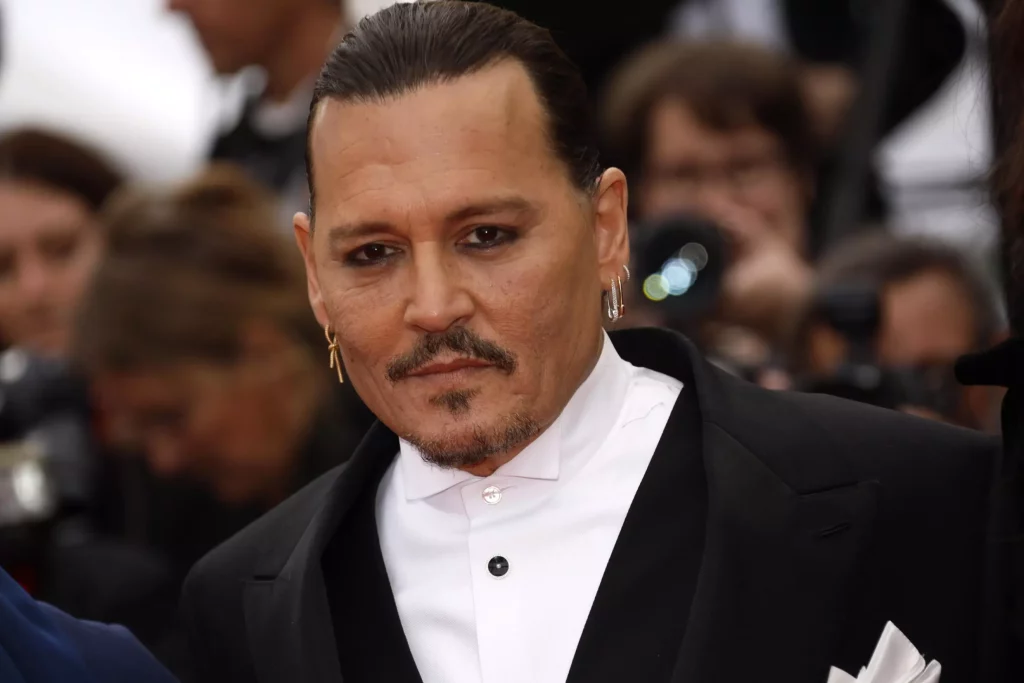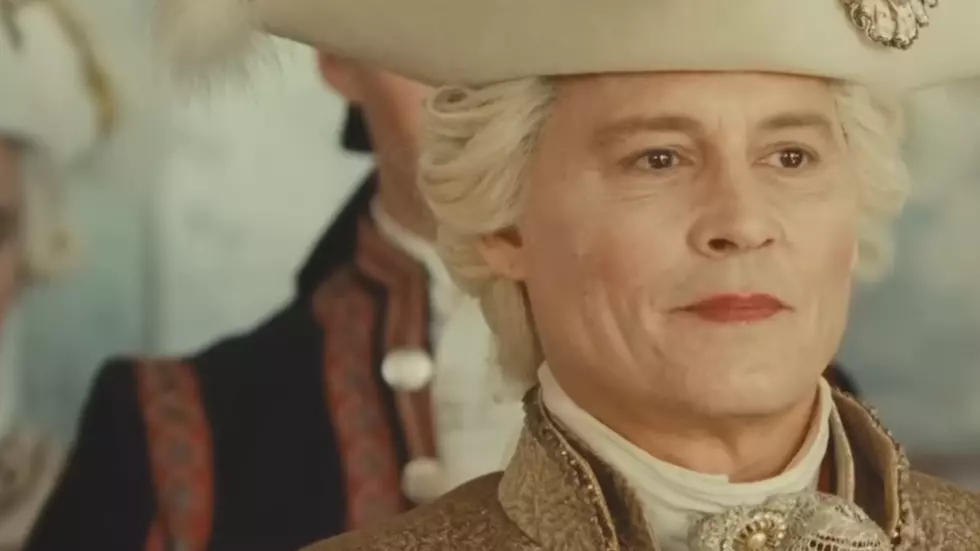The 76th Cannes Film Festival kicked off on Tuesday with the red-carpet premiere of French director Maïwenn’s historical drama “Jeanne du Barry”, about French king Louis XV’s scandalous relationship with a lowly courtesan, starring Johnny Depp as the monarch in a high-profile comeback that has generated plenty of controversy.
Scandal is a clichéd word in Cannes, commonly slapped onto just about anything that causes a stir on and off the screen.
There are the many sexist scandals, of course, such as the 2016 “Heelgate” controversy that saw women in flat shoes barred from the red carpet. That was followed a year later by the controversial airbrushing of Claudia Cardinale on the official poster for the 70th festival edition.
Naturally, the movies have sparked their fair share of clamour. Four years ago, Abdellatif Kechiche’s sexually-explicit, three-hour-long nightclub extravaganza “Mektoub my Love: Intermezzo” triggered a walkout by the lead actress during its gala premiere. The film has since vanished from the radars, still unreleased.
Other, older fracas are now part of Cannes folklore. They include the uproar that followed the unsimulated fellatio in Vincent Gallo’s “The Brown Bunny” (2003) or the gorging-to-death in Marco Ferreri’s “La Grande Bouffe” (1973), which saw people spit on the director as he exited the screening and jury president Ingrid Bergman reportedly throw up.
Fifty years on, another Swede – two-time Palme d’Or laureate Ruben Ostlund – heads the jury of the festival’s 76th edition, which opened on Tuesday with the screening of Maïwenn’s “Jeanne du Barry”, about an explosive scandal that roiled the court of Versailles in the 18th century.
It stars Johnny Depp as the French king Louis XV in his first role since his short-lived marriage with actress Amber Heard was raked over in lurid detail during a defamation trial in the United States.
Depp, 59, was feted by fans as he arrived at the Palais des Festivals, sporting a ponytail and shades. He spent several minutes schmoozing with the crowd, posing for selfies and signing autographs, before heading up the film world’s most famous red carpet for the gala premiere of Maïwenn’s curtain-raiser.
‘Impunity’
The film revolves around the king’s tumultuous relationship with his final mistress Jeanne du Barry, played by Maïwenn, a commoner and courtesan whose admission to the gilded palace of Versailles naturally causes an almighty scandal.
Depp signed up for the role of Louis XV before the start of a legal battle with his ex-wife involving bitter accusations of domestic violence that threatened to derail his career. He has since been axed from Harry Potter spin-off “Fantastic Beasts” following Heard’s abuse allegations, though he is a long way from being “cancelled”.
The US star long beloved of the French has secured a record $20 million deal to remain the face of Dior fragrance, according to Variety last week. He is also set to direct Al Pacino in a biopic of artist Amedeo Modigliani later this year. Still, the decision to hand his comeback movie pride of place at Cannes has inevitably raised eyebrows.
In remarks to the press on Monday, Cannes director Thierry Frémaux defended the choice, praising Depp’s part in the film and saying he paid no attention to the trial. “To tell you the truth, in my life, I only have one rule, it’s the freedom of thinking, the freedom of speech and the freedom to act within a legal framework,” said Frémaux. “If Johnny Depp had been banned from acting in a film, or the film was banned, we wouldn’t be here talking about it.”

Although the film is playing out of competition, members of the Palme d’Or jury were also asked about Depp’s presence during their traditional opening press conference. Outspoken MeToo supporter Brie Larson, star of “Captain Marvel”, looked flustered as she took a question on the subject, curtly replying: “I don’t know how I feel about it”.
Depp’s fall from grace is not the only controversy surrounding “Jeanne du Barry”, whose director has been a critic of the MeToo movement, once stating: “I hope men will catcall me in the street for the rest of my life”.
In March, a well-known French journalist, Edwy Plenel of the investigative news website Mediapart, lodged a criminal complaint for assault against Maïwenn, accusing her of approaching him in a restaurant, grabbing him by the hair and spitting in his face.
Maïwenn has admitted the assault in an interview on French TV, without going into details. Plenel said it may have been motivated by articles about the rape allegations surrounding Maïwenn’s ex-husband and father of one of her children, director Luc Besson (“The Fifth Element”), whom she married aged 16.
Her Cannes curtain-raiser comes just days after prominent actress Adèle Haenel (“Portrait of a Lady on Fire”), a French icon of MeToo, announced she was giving up movie acting to “denounce the general complacency in our industry towards sexual abusers”. It prompted a group of 123 French film industry workers to denounce the festival in an open letter published by Liberation newspaper on Monday.
“By rolling out the red carpet to men and women who commit assaults, the festival demonstrates that violence in creative circles can be exercised with complete impunity,” read the article, whose signatories include Julie Gayet and Laure Calamy among other prominent actors.
Back to Versailles
Still only 47, Maïwenn already has a distinguished record at the world’s premier film shindig, having won the Jury Prize in 2011 with her breakthrough film “Polisse”. Four years later, her follow-up feature “My King” earned Emmanuelle Bercot a best actress award.

A grand costume affair shot on 35mm film in the Palace of Versailles, “Jeanne du Barry” signals a radical change of scale and style for the French filmmaker, whose $20 million movie was part-funded by Saudi Arabia’s Red Sea Film Foundation. Its classicism is as rigid as the court protocol of Versailles, shirking the naturalism and improvisation that characterised her past work.
The film is also bizarrely chaste, limiting the famously libertine king’s last passionate love affair to playful giggles, adoring gazes and the odd kiss.
In a world where “gallantry” and rape are scarcely distinguishable, choosing to be a libertine “is one way of being a woman and also of being free”, says the voice-over narrator early on in the film, describing Jeanne du Barry as a “daughter of nothing, ready to do anything”.
Depp, who was previously married to French star Vanessa Paradis, gives a solid physical performance, though his dialogue is kept to short phrases that help disguise his American accent. Benjamin Lavernhe plays his stoic valet La Borde, while India Hair excels as the king’s daughter Adélaïde, hell-bent on expelling the “scandal” her father allowed into the royal palace.
There’s also Melvil Poupaud in the role of Jeanne’s earlier lover and pimp, the charming and ruthlessly self-serving Comte du Barry, though his and other parts remain underdeveloped in a film that is entirely absorbed with its titular character.
Maïwenn has described the film as the fulfilment of a 17-year dream. She said her interest in Jeanne du Barry came from watching Sofia Coppola’s Versailles-set “Marie Antoinette” (2006), in which Asia Argento played Louis XV’s mistress.
Like Coppola’s lush art album, “Jeanne du Barry” is set in a cocoon, a self-contained world of indulgence, lavish costumes and architectural wonder that shuts out the external world. But it lacks the boldness and inventiveness that powered “Marie Antoinette”.
It also lacks the deeply moving intimacy of Albert Serra’s haunting “The Death of Louis XIV” (2016), starring New Wave icon Jean-Pierre Léaud in an absorbing, candle-lit account of the Sun King’s final days in the palace he built.
A witty, working-class woman hungry for culture and pleasure, Jeanne du Barry is undoubtedly a more interesting character than poor-little-rich-girl Marie-Antoinette. But while Maïwenn’s own fascination with Louis XV’s favourite mistress is all too obvious on the screen, the film doesn’t quite make it contagious.




